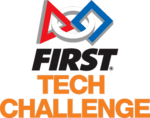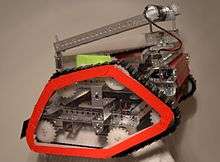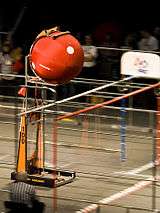FIRST Tech Challenge
|
Current season, competition or edition: | |
 | |
| Formerly | FIRST Vex Challenge |
|---|---|
| Sport | Robotics-related games |
| Founder | Dean Kamen & Woodie Flowers |
| Inaugural season | 2005 |
| Director | Ken Johnson |
| Country | International |
| Venue(s) | Detroit and Houston (world level), numerous smaller locations (national, superregional, and state levels) |
| Most recent champion(s) |
Inspire Award Winner St. Louis: Inspire Award Winner Houston: Champion Teams St. Louis: Champion Teams Houston: |
| TV partner(s) | NASA TV, Twitch.tv |
| Related competitions |
FIRST Robotics Competition FIRST Lego League FIRST Lego League Jr. |
| Official website | FTC |
The FIRST Tech Challenge (FTC) is designed for students in grades 7–12 to compete head to head, using a sports model. Teams are responsible for designing, building, and programming their robots in a 10-week build period to compete in an alliance format against other teams. The robot kit is reusable from year-to-year and is programmed using Java or the MIT App Inventor. Teams, including coaches, mentors and volunteers, are required to develop strategy and build robots based on sound engineering principles. Awards are given for the competition as well as for community outreach, design, and other real-world accomplishments.[1] The ultimate goal of FTC is to reach more young people with a lower-cost, more accessible opportunity to discover the excitement and rewards of Science, Technology, Engineering, and Mathematics.
History
The FIRST Tech Challenge grew out of the existing FIRST Robotics Competition and the IFI Robovation platform. FIRST, RadioShack, and Innovation First collaborated to develop an improved version of the IFI Robovation kit. The kit was significantly upgraded and called the VEX Robotics Design System. For the 2008 season Pitsco developed a platform that uses the NXT brick along with additional hardware and a new structural framework under the new name of TETRIX. Using aluminum parts that will allow participants to add Lego parts and sensors, the kit includes 4 DC motors and larger wheels. In addition to hardware changes, the system was programmed with LabVIEW or RobotC.
In 2005–06, FIRST piloted the FIRST Vex Challenge as a potential program.[2] The pilot season brought together over 130 teams to compete in 6 regional tournaments in a 1/3 scale FIRST Frenzy: Raising the Bar.[3] Fifty teams participated in the FVC tournament at the FIRST Championship in April, 2006. On April 29, 2006 the FIRST Board of Directors voted to extend FVC for the 2006–2007 season.
In Summer 2007, after two seasons as the FIRST Vex Challenge, FIRST announced that the program would be renamed the FIRST Tech Challenge.
In the 2015-2016 FTC Res-q season, the NXT bricks that were used previously as the robot controller were replaced by Android phones running Android KitKat (4.4).[4]
Competition

Advancement from one level of competition to another in FIRST Tech Challenge can be achieved by either winning on the field (~33%) or by winning the awards listed below during judging (~66%).
Schedule
In September each year FIRST announces the game challenge to FTC teams at Kickoff. Unlike FRC, there is no 'ship day' when the robot has to be finished; teams can work on their robots up to and during competitions.[5] Qualifying Tournaments and Regional/State Championships occur from October through March. For teams advancing from the United States, from the 2013-14 through the 2017–18, four Super-Regional Championship Tournaments have been held from March through early April, with the World Championships occurring in late April. Starting with the 2018-19 FTC season the Super Regional Championships will no longer occur and teams will advance from their local championships directly to one of the two World Championships in Houston or Detroit.[6]
Inspections
Before the start of each competition, a robot and field inspection is held to ensure that each team's robot is up to the qualifications of the challenge.
Engineering Notebook
Along with building and programming a robot, FTC teams are required to create an 'Engineering Notebook' that documents their build season and team experience.[7] It helps teams learn the value of the engineering process and gives them an opportunity to reflect on their experiences and improve. It also shows the judges at tournaments what the teams have overcome throughout the year. By emphasizing both application and documentation along with outreach FIRST Tech Challenge participants learn a range of skills in addition to experiencing the thrill of competing on the field.
Judges' Interviews
On an assigned date, teams present for 5 minutes in front of a judging panel. The entire team does not have to be present, but it is recommended. During these 5 minutes, teams should explain the main points of the season. They should explain their robot design, programs, outreach, fundraising, sustainability, and any other things that they find worth sharing. After the presentation, judges will have the opportunity to ask any questions that they want to be answered by the team.
Matches
On competition days, the number of matches varies based on the number of teams competing. Matches are completely random in their order and alliances. During the matches, teams are assigned either red alliance or blue alliance. All parties involved in the match must choose their programs before the match begins. Drivers must not touch the controllers during the first part of the match, also known as the autonomous period. The drivers then have a five-second break to pick up their controllers and start their programs. The period after this is called the teleop period and the match is completely driver-controlled from then on. In the final 30 seconds of the match, drivers attempt to park in a point scoring zone and/or complete tasks that can only be done in the end game period of the match. After the match is completed, players pick up their robots and go back to their pit area to do any necessary adjustments to their robot or to discuss strategy. Meanwhile, points are tallied (including penalty points) and the winning alliance is announced. The winning alliance receives two qualifying points while the losing alliance receives zero.
Events
Official FTC events are Qualifying or Championship Tournaments; unofficial events are Scrimmage Tournaments. Based on their performance in their Regional/State Championships (US) teams are invited to one of the World Championship based on predetermined advancement criteria. Qualifying Tournaments exist in areas with a large number of teams. Winners of Qualifying Tournaments are invited to Championship Tournaments and until 2017-18 winners of Championship tournaments were then invited to Super-Regional Tournaments.[8] After the winning alliances of the two championships are declared, they are invited to participate in the Festival of Champions in Manchester, New Hampshire to determine the FTC World Champion. On January 10, 2018, FTC announced that Super-Regionals will be abolished after the 2017-2018 season. Due to this, the number of FTC teams that will attend each World Championship will be increased from 128 to 160 starting in 2019.[9]
Teams advance from one level of competition to the next based on the advancement criteria laid out in the first part of that year's Game Manual. The Advancement criteria was changed for the 2015-2016 season to add criteria 7 "Winning Alliance, 2nd Team selected" and 13 "Finalist Alliance, 2nd Team selected," shifting the successive criteria down one position.[10]
Awards
In addition to the Winning and Finalist Alliances receiving recognition for their field performance; the following are awards presented at official Championship and Qualifying Tournaments based on judging criterion including engineering notebook, team interview, observation, and/or field performance:[11]
For teams
- Inspire Award: This award is generally given to teams who achieve greatness in all parts of FIRST including programming, robot design, the engineering notebook, judging presentations, gracious professionalism, and outreach. This team embodies what it is to be a FIRST robotics team and is a team that others can look up to as a role model. The Inspire Award is the highest ranked award as it embodies all other awards inside of it and allows a direct bid to the next level of competition.
- Think Award: The winning team of this award clearly displays their engineering and design process in their engineering notebook. This award honors the team who had an engineering section of their engineering notebook that clearly displayed the mathematics, science, and design process that went into the building of their robot.
- Connect Award: This award is granted to the team that most connects to their engineering community outside of FIRST by sharing who they are, what FIRST is, and how others can become involved. On top of that, this team's engineering notebook shows that they have a clear fundraising, business, and outreach plan that they will follow throughout the season.
- Rockwell Collins Innovate Award: This award is given to the team with the most innovative and creative robot design. This robot must work in a consistent manner but does not need to perform well in every round to be eligible for this award.
- Design Award: This award focuses on the design aspect of the robot. The team winning this award must show a thoughtful design on their robot that is both functional and aesthetic. The robot must distinguish itself from other competitors by showing off its unique design.
- Motivate Award: The winning team of this award exemplifies what it means to be a FIRST team. This team works together by showing gracious professionalism at competitions and by recruiting and assisting other teams and members at home.
- Control Award: This programming centered award commends the team that had the best use of unique programs and successful sensors used in their rounds. This team's engineering notebook must have had a very detailed in explaining their implementation of software, sensors, and mechanical control.
- Promote Award (optional): This award is given to the team who created the best 60-second video message for the public and other members of FIRST. This video should be inspirational in the way of our changing culture of science, technology, engineering, and mathematics.
- Judges Award (optional): This award is given to teams who exemplify traits that should receive recognition by do not fit into any other category of awards.
For individuals
- FIRST Tech Challenge Dean's List: (see "Dean's List")
- Compass Award (optional): This award recognizes a specific coach or mentor for their outstanding contributions to their teams and FIRST as a whole. The candidates are nominated by their students who then submit a 40-60 second video explaining why their coach or mentor should receive this award.
Competition themes
In the past, the challenges have been based on several different themes:
- 2018-2019: Rover Ruckus
- 2017–2018: FIRST Relic Recovery
- 2016–2017: FIRST Velocity Vortex
- 2015–2016: FIRST RES-Q
- 2014–2015: Cascade Effect
- 2013–2014: Block Party!
- 2012–2013: Ring It Up!
- 2011–2012: Bowled Over!
- 2010–2011: Get Over It!
- 2009–2010: Hot Shot!
- 2008–2009: Face Off
- 2007–2008: Quad Quandary
- 2006–2007: Hangin'-A-Round
- 2005–2006: Half-Pipe Hustle
Gracious Professionalism
FIRST Tech Challenge seems, on the outside, a robotics competition, but the core value that FIRST Tech Challenge promotes is embodied in the phrase "Gracious Professionalism." Although FIRST Tech Challenge includes thousands of competitive teams, gracious professionalism makes it a friendly competition where teams help other teams, and fun makes a strong presence in any tournament.
FIRST states that "With Gracious Professionalism, fierce competition and mutual gain are not separate notions. Gracious professionals learn and compete like crazy, but treat one another with respect and kindness in the process. They avoid treating anyone like losers. No chest thumping tough talk, but no sticky-sweet platitudes either. Knowledge, competition, and empathy are comfortably blended." [12]
See also

- FIRST - FIRST Organization
- FIRST Robotics Competition
- FIRST Lego League
- FIRST Championship
- LabVIEW
- Android Studio
References
- ↑ http://www.usfirst.org/roboticsprograms/ftc
- ↑ "Finding the Top Bot: High School Students (and Their Robots) Take the Prize at Tech Challenge". Scientific American. Retrieved 5 June 2011.
- ↑ "2005 Vex Field". chiefdelphi.com. Retrieved 10 April 2012.
- ↑ "FIRST® Announces 'Game-Changing' Technology Platform for use in Worldwide Student Robotics Competitions". Retrieved 15 January 2016.
- ↑ "Making the move to FTC". FLL® Community Stories. Retrieved 6 June 2011.
- ↑ "2011- 2012 FTC Season Calendar". FIRST. Retrieved 6 June 2011.
- ↑ "Get Over It! Game Manual" (PDF). FIRST. Archived from the original (PDF) on 2 December 2010. Retrieved 6 June 2011.
- ↑ "Archived copy" (PDF). Archived from the original (PDF) on 2013-11-02. Retrieved 2013-08-29.
- ↑ "Super Regionals - Then and Now". Retrieved 2018-01-14.
- ↑ "Game Manual Part 1" (PDF). FIRST. Retrieved 4 December 2016.
- ↑ "Game Manual Part 1" (PDF). FIRST. Archived from the original (PDF) on 12 September 2014. Retrieved 25 September 2014.
- ↑ "Gracious Professionalism | USFIRST.org". archive.usfirst.org. Retrieved 2015-12-14.
External links
| Wikimedia Commons has media related to FIRST. |
